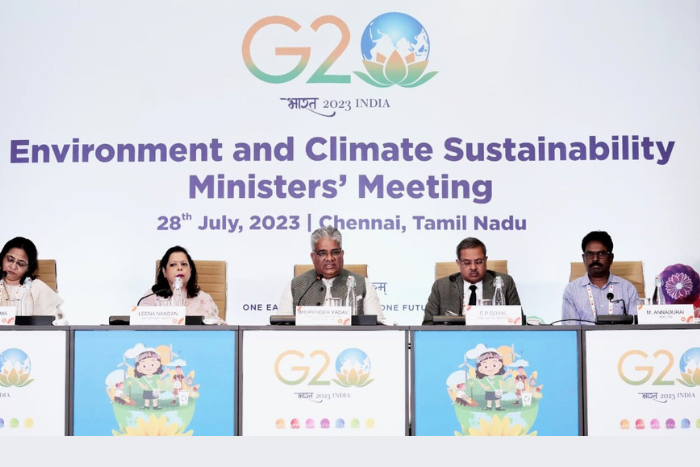The final meeting of the G20 Energy Transition Working Group (ETWG) concluded in Goa, India on July 23. After days of intense negotiations, the ETWG failed to produce a joint communique. Global security and the ongoing conflict in Ukraine, language on fossil fuels, and emission pathways were among the many contentious issues at the meet. The preliminary draft of the communique, prepared following the previous ETWG meeting carried significant ratcheting up of ambition on fossil fuels when compared to last year’s declaration from the G20 meetings in Indonesia. However, the final outcomes and the chair summary steer clear of any such proclamations, leaning instead on ambiguous language. However, one area that emerged with clear endorsement is nuclear power. The expansion of nuclear power and the development of small module reactor (SMR) technology has been projected prominently as an important instrument in the decarbonisation toolkit.
Days later, the Environment, Climate and Sustainability working group meeting in Chennai produced a similarly underwhelming outcome. In the absence of consensus, the agreed paragraphs in the outcome document barely consisted of any actionable items, collective targets or approaches.
Study reveals correlation between higher political participation of STs and increased forest cover
A recent study found that greater political representation of Scheduled Tribes (ST) improved average tree canopy and slowed deforestation. According to a study titled “Representation and Forest Conservation: Evidence from India’s Scheduled Areas”, the Panchayat Extension to Scheduled Areas Act (PESA) and other laws that recognise the Scheduled Areas where STs live, play a crucial role in protecting their rights and forest conservation. Having better representation also enabled ST communities to fight mining and other major commercial enterprises. The study indicated that prior to PESA’s implementation, deforestation rates in communities close to mines were higher. However, the implementation of the Scheduled Tribes and Other Traditional Forest Dwellers (Recognition of Forest Rights) Act (FRA), 2006, did not have a visible impact beyond the benefits of PESA.
Triple sustainable lending by 2030 to fight poverty and climate change: G20 panel to MDBs
A G20 panel commissioned by the Group of 20 nations to propose reforms for MDBs called for various changes in the way MDBs operate. The panel said that to reduce poverty and meet climate targets, MDBs must establish a new funding structure and triple sustainable lending by 2030. The panel predicted that developing nations will need to spend an additional $3 trillion annually by 2030 to cover investments in climate action and meet their development goals, excluding China, which has adequate domestic resources to finance its transition to clean energy. According to the panel, $1.8 trillion of this amount—a four-fold increase from 2019—should go towards sustainable infrastructure, and $1.2 trillion would be required to accomplish other objectives, such as a 75% increase in health and education spending.
Developed nations must fulfill the $100 billion delivery: India and UAE
In the joint statement, India and the UAE urged the international community to act quickly to protect the long-term objectives of the Paris Agreement by fulfilling nationally set contributions. According to Prime Minister Narendra Modi and UAE President Sheikh Mohamed bin Zayed Al Nahyan, developed countries must carry out the $100 billion delivery plan in order to reduce and adapt to the effects of climate change. The latter stressed the necessity of implementing a balanced strategy for the Global Stocktake at COP28 and urged the nations to use the GST results to fortify their national pledges, especially those on mobilising more funding and assistance for the developing world. Earlier this month, Al Jaber met with climate ministers from countries including Brazil, China and the US in Belgium. There he said governments must face up to their failures to tackle climate change at the next UN climate summit.
River woes: rampant mining, incorrect classification
Recent reports shed some light on the state of rivers in the country. A report by the Report’s Collective said that Uttarakhand chief minister Pushkar Singh Dhami lobbied to obtain permit to keep mining the four rivers that pass through the state’s highlands and forests as the authorisation to mine was about to expire. Documents show the Union government repeatedly approved mining in Gaula river despite the state government’s failure to comply with terms to protect the environment. This approval came after the CM’s meeting with the Union Environment and Forest Minister Bhupender Yadav in New Delhi.
Another report by DTE mentioned how river rights advocates and water experts have criticised a three-year-old government order (GO) issued by the irrigation department of the Uttar Pradesh government classifying the Gomti as a “non-perennial river”. The GO was granted on September 3, 2020, but it has only lately come to light. It’s expected that the state’s floodplain regions will be the focus of a number of upcoming development initiatives. Therefore, this GO has resurfaced as the authorities are looking for any applicable orders to define the floodplains.


